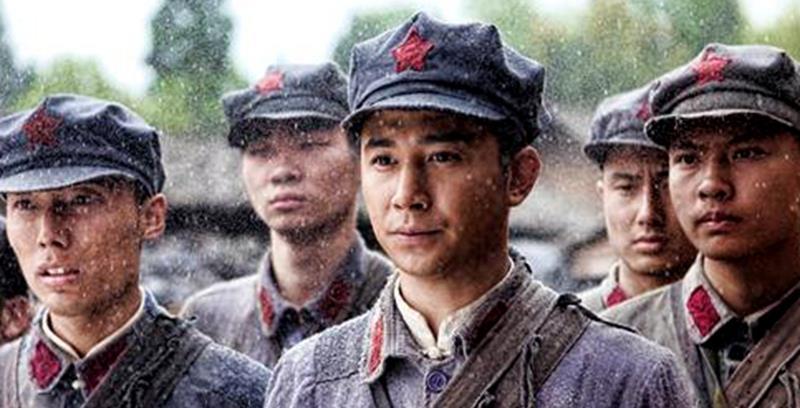In October 1936, after the victory of the Red Army's Long March, the Central Military Commission decided to establish the Western Route Army on the basis of more than 20,000 horses of the Red Fourth Front during the Long March. The main purpose of the establishment of the Western Route Army was to open up the channels for the Soviet Union to aid the Chinese revolution and save the revolution. The Western Route Army has three armies under its jurisdiction, namely the Red Fifth Army, the Red Ninth Army and the Red Thirty Army. Unfortunately, for various reasons, the Western Route Army suffered defeat after crossing the Yellow River, and finally ended in a fiasco, and the entire Western Route Army was almost completely destroyed.
Among the three armies under the jurisdiction of the Western Route Army, only the senior generals were killed by the Red Ninth Army, and the commanders, political commissars and chiefs of staff of this unit all died heroically in the Western Expedition, which can be called the most tragic army (Note: The commander and political commissar of the Red Fifth Army also died in battle, but the chief of staff was killed in Xinjiang), and today we will talk about the story of the senior generals of the Red Ninth Army.

First, military commander Sun Yuqing
The commander of the Red Ninth Army was named Sun Yuqing, who was born in 1909 in Hong'an, Hubei Province. Sun Yuqing joined the revolution earlier, and in 1927, at the age of 16, Sun Yuqing joined the Jute Uprising and joined the Red Army two years later. Sun Yuqing can be said to be one of the fastest-promoted generals in the history of the Red Army, joining the Red Army in 1929 as an ordinary soldier and four years later being promoted to commander of the Red Thirty-first Army. In August 1935, Sun Yuqing was transferred to the Red Ninth Army as a commander, and together with the Red Ninth Army won the victory of the Long March.
After the Long March, the Red Army established the Western Route Army, and Sun Yuqing's Red Ninth Army also became one of the three teams of the Western Route Army. Unfortunately, after the Red Ninth Army crossed the Yellow River, it encountered an unprecedented crisis, because of the successive defeats, Sun Yuqing's commander was also revoked. In 1937, after the death of Dong Zhentang, the commander of the Fifth Red Army, Sun Yuqing was promoted to the commander of the Fifth Red Army because there was no one available. However, in the course of the guerrilla campaign in Qilian Mountain, Sun Yuqing was unfortunately captured by the enemy, and then died at the age of 28 because of the betrayal of the traitor.
Second, political commissar Chen Haisong
Chen Haisong was born in 1914, a native of Henan, to a poor peasant family. He was influenced by revolutionary ideas earlier, and at the age of 16 he joined the local boy scout regiment and performed well in the boy scout group, so that he officially became a soldier in the Red Army in the same year.
Compared with the military commander Sun Yuqing, Chen Haisong's promotion speed was not slow at all, Chen Haisong joined the Red Army as an ordinary soldier, in November 1934, the 20-year-old Chen Haisong had been promoted to political commissar of the Red Ninth Army, and it took only four years to become a leader of the regular army, which was comparable to Sun Yuqing's promotion speed.
After the victory of the Long March, Chen Haisong also joined the Western Route Army and served as the political commissar of the Red Ninth Army. Unfortunately, after crossing the Yellow River, Chen Haisong was faced with a difficult and dangerous road. In March 1937, in Linxia, Gansu, Chen Haisong fell into the encirclement of Ma Jiajun, and in order to cover the retreat of the large troops, he bravely faced the enemy ten times larger than himself, and finally died heroically, only 23 years old.
Third, Chief of Staff Chen Bozhi
Chen Bozhi was born in 1910, also to a poor peasant family. Chen Bozhi was quite talented when he was a teenager, and he was one of the three local talents, but unfortunately he could only drop out of school at home because of his family's poverty, and in 1930, at the age of 20, Chen Bozhi joined the Red Army and became an ordinary soldier in the Red Fourth Front.
After this, Chen Bozhi participated in various anti-"encirclement and suppression" battles, and he also became the political commissar of the regiment from an ordinary soldier. In May 1935, Chen Bozhi's Red Fourth Front officially participated in the Long March. During the Long March, Chen Bozhi was appointed chief of staff of the Red Ninth Army, and in October 1936 won the victory of the Long March.
After the Long March, Chen Bozhi's Red Ninth Army was incorporated into the Western Route Army, and he continued to serve as the chief of staff of the Red Ninth Army. In November 1936, after the Red Ninth Army crossed the Yellow River, Ma Jiajun, who encountered Ma Bufang in the area of Gulang City, in order to cover the retreat of the large troops, Chen Bozhi bravely threw himself into the battle, facing the fierce fire of the enemy, Chen Bozhi died heroically, at the age of 26.
Resources:
"The Western Route Army of the Chinese Workers' and Peasants' Red Army" Hao Chengming and so on